| Srl | Item |
| 1 |
ID:
131068
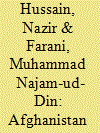

|
|
|
| 2 |
ID:
086578
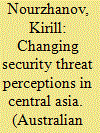

|
|
|
|
|
| Publication |
2009.
|
| Summary/Abstract |
This article discusses the current process of securitisation in Central Asia and identifies its convoluted and faulty nature as a factor impeding collective security action in the region. It uses the Regional Security Complex Theory (RSCT) as an explanatory tool and posits that security discourse in - and about - the five former Soviet republics is dominated by geopolitical grand strategy on the one hand and by particularist concerns about lack of democracy or transnational threats on the other. Issues of conventional security involving two or more states, such as territorial disputes or resource management, are pushed aside and rarely securitised at the official level. The article outlines conceptual and institutional reasons for this bias, and argues that unless inter-state tensions are properly analysed, debated and addressed, the prospects for security and stability in the region will remain grim.
|
|
|
|
|
|
|
|
|
|
|
|
|
|
|
|
| 3 |
ID:
184398
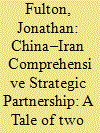

|
|
|
|
|
| Summary/Abstract |
The China-Iran comprehensive strategic partnership (CSP) has been described as a potentially disruptive alignment. This article analyses the impact of the CSP in two regional security complexes (RSCs): the Persian Gulf and South Asia. It finds that of the two RSCs, the China-Iran CSP has a greater likelihood of affecting the strategic landscape of the South Asian RSC as China seeks to contain India's power and influence. In the Persian Gulf, China's economically-motivated regional presence is supported by the maintenance of the status quo, and as a result the CSP is not likely to adversely affect that RSC.
|
|
|
|
|
|
|
|
|
|
|
|
|
|
|
|
| 4 |
ID:
157503
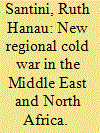

|
|
|
|
|
| Summary/Abstract |
Since the 2003 Iraq war, the Middle East and North Africa has entered into a New Regional Cold War, characterised by two competing logics: on the one hand, the politicisation of sectarianism opposing a Saudi-led Sunni bloc against an Iran-led Shia bloc and, on the other, an intra-Sunni cleavage around the mobilisation of political Islam, embodied by the Muslim Brotherhood and its supporters vs its opponents. Blending Buzan and Weaver’s regional security complex theory with Donnelly’s notion of ‘heterarchy’ and applying it to the cold wars the region has experienced, the similarities and differences between the Arab Cold War of the 1950s/60s and the New Regional Cold War reveal the increasing number of heterarchic features within the regional security complex: multiple and heterogeneous power centres, different power rankings, a more visible and relevant role of non-state and transnational actors, and the fragmentation of regional norms.
|
|
|
|
|
|
|
|
|
|
|
|
|
|
|
|
| 5 |
ID:
161327
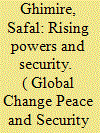

|
|
|
|
|
| Summary/Abstract |
Interactions of rising powers and established powers and their implications in peacebuilding and security remain underexplored in existing literature. This paper aims to explore inferences of the behaviour of Brazil, China and India in peacebuilding and security, their contention and cooperation with the US and European powers, and implications for the global south. It analyses their interactions in the light of democratic peace propositions, adhered to by established powers, and the regional security complex theory pertinent to the ascendancy of new powers. Though liberal countries are co-opting emerging actors, the responses of rising powers to international security issues appear inconsistent and unpredictable. With increasing material capabilities, rising powers have been creating a patron–client relationship with conflict-affected states, because of which this article disconfirms possibilities of a sometimes anticipated pro-south world order.
|
|
|
|
|
|
|
|
|
|
|
|
|
|
|
|
| 6 |
ID:
175107
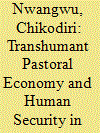

|
|
|
|
|
| Summary/Abstract |
The limited access to land in most African states has engendered a fierce competition, especially among various agricultural user groups. The two major groups of agricultural land users are transhumant pastoralists and sedentary peasant farmers. The internecine conflict between these agro-user groups has grave implications for human security in Nigeria and beyond. Explanation of the conflict has centred on climate change and environmental security, population growth and urbanisation, and insecurity. However, the transnational character of this conflict, often made possible by relevant regional protocols, has not received adequate scholarly attention. This paper argues that networking of regional bodies and other stakeholders is the panacea for tackling the tension-soaked relationship between these land users.
|
|
|
|
|
|
|
|
|
|
|
|
|
|
|
|